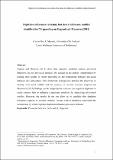Depletion influences restraint, but does it influence conflict identification? Expanding on Osgood and Muraven (2015)
Date
09/2015Metadata
Show full item recordAbstract
Osgood and Muraven (2015) show that cognitive depletion reduces pro-social behaviors, but not pro-social attitudes. We expand on the authors’ interpretation by relating their results to recent theorizing on the relationship between pro-social behavior and self-control. This framework distinguishes between the proclivity to identify self-control conflict and the capacity to exercise restraint. Osgood and Muraven’s (2015) findings can be interpreted as evidence that cognitive depletion in social contexts fails to influence a necessary condition for identifying self-control conflict. However, the results do not yet allow us to conclude that depletion influences capacity to exercise restraint. Further work is needed to understand the mechanisms by which cognitive depletion influences pro-social behavior.
Citation
Myrseth , K O & Wollbrant , C 2015 , ' Depletion influences restraint, but does it influence conflict identification? Expanding on Osgood and Muraven (2015) ' , Basic and Applied Social Psychology , vol. 37 , no. 5 , pp. 292-293 . https://doi.org/10.1080/01973533.2015.1071708
Publication
Basic and Applied Social Psychology
Status
Peer reviewed
ISSN
0197-3533Type
Journal item
Collections
Items in the St Andrews Research Repository are protected by copyright, with all rights reserved, unless otherwise indicated.

